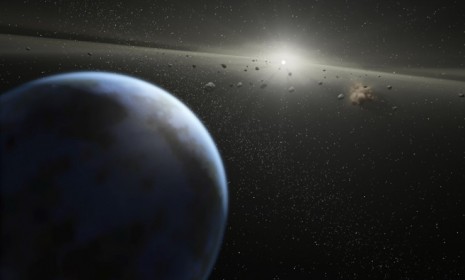Could a 'humongous' asteroid really hit Earth in 2040?
Scientists warn that a space rock longer than a football field could smash into our planet

A free daily email with the biggest news stories of the day – and the best features from TheWeek.com
You are now subscribed
Your newsletter sign-up was successful
Wary scientists are keeping their eyes on a giant asteroid that has a teeny-tiny chance of smashing into Earth in 2040. The "humongous" rock's trajectory is apparently worrisome enough that some experts are already calling for ideas on how to deflect it. Here's everything you need to know about this potentially Earth-threatening asteroid:
How big of a threat is it?
Scientists are unsure of the 460-foot-wide rock's exact composition, or how devastating its impact would be. But after observing the space rock's orbit, they've calculated a 1-in-625 chance that the asteroid called 2011 AG5 could collide with Earth on Feb. 5, 2040. "2011 AG5 is the object which currently has the highest chance of impacting the Earth," says Detlef Koschny of the European Space Agency.
The Week
Escape your echo chamber. Get the facts behind the news, plus analysis from multiple perspectives.

Sign up for The Week's Free Newsletters
From our morning news briefing to a weekly Good News Newsletter, get the best of The Week delivered directly to your inbox.
From our morning news briefing to a weekly Good News Newsletter, get the best of The Week delivered directly to your inbox.
How did researchers calculate those odds?
The object was first spotted in January 2011, and scientists have since observed half of the rock's orbit around the sun. They'll get a much better idea of 2011 AG5's trajectory when they get another unobstructed view of the rock in September 2013, and again in November 2015. Once scientists have the new data, they'll be able to more accurately predict 2011 AG5's future path. By 2015, says Donald Yoemans, head of NASA's Jet Propulsion Laboratory," we fully expect that the odds will go way down, most likely to zero."
In the meantime, how seriously are scientists taking this?
Seriously enough to talk about. NASA has moved 2011 AG5 up its list of Near-Earth Objects to keep an eye on. And the asteroid was on the agenda for a United Nations Scientific and Technical Subcomittee meeting earlier this month in Vienna.
A free daily email with the biggest news stories of the day – and the best features from TheWeek.com
How can we deflect the asteroid if it comes too close?
Experts are considering all sorts of "far-out plans," says Ned Potter at ABC News. "If they have enough time, they might send a probe with thruster rockets, or even explosives, to nudge an asteroid into a slightly different orbit." But for now, don't worry. "The bottom line is: We have time," says Yoemans. "The sober approach is to make more observations, to wait and see."
Sources: ABC News, CBS News, Christian-Science Monitor, Discover
-
 How the FCC’s ‘equal time’ rule works
How the FCC’s ‘equal time’ rule worksIn the Spotlight The law is at the heart of the Colbert-CBS conflict
-
 What is the endgame in the DHS shutdown?
What is the endgame in the DHS shutdown?Today’s Big Question Democrats want to rein in ICE’s immigration crackdown
-
 ‘Poor time management isn’t just an inconvenience’
‘Poor time management isn’t just an inconvenience’Instant Opinion Opinion, comment and editorials of the day